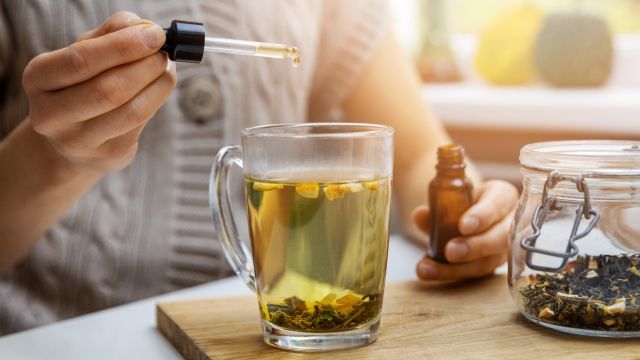Updated on June 14, 2022.
From vitamin store oils to online foot creams, cannabidiol (CBD) can be found just about everywhere these days, in a stunning array of products. Millions of people are getting in on the trend. In 2019, Consumer Reports estimated that about 64 million Americans had tried CBD over the previous two years, often to treat a health condition like insomnia, anxiety, or pain.
The problem is, while people take CBD for a multitude of medical issues, there is currently little scientific evidence it actually helps. In some cases, it may even pose safety risks. That’s why healthcare providers (HCPs) must be careful about the information they relay to patients—and why patients should let their HCPs know if they’re taking CBD.
So, what is CBD, exactly? Do the purported health perks really live up to the hype? And what potential problems should patients keep in mind?
The basics of CBD
CBD is a cannabinoid, a chemical compound that comes from the cannabis plant. There are more than 100 known cannabinoids, including CBD and tetrahydrocannabinol (THC), the substance that creates a high when you use marijuana. Unlike THC, CBD has no psychoactive effect, which is part of its mainstream appeal.
Certain varieties of the cannabis plant have lower amounts of THC and higher amounts of CBD. These types are commonly known as hemp, and they’re often used to make CBD products, including oils, sprays, creams, and pills.
Currently, the legal status of these and other CBD products is complicated. Though the 2018 Farm Bill legalized hemp on a federal level, state and local regulations vary widely, meaning what’s readily available in Colorado may be unlawful next door in Nebraska.
The U.S. Food and Drug Administration (FDA) also restricts how CBD can be advertised and sold. It’s against the law to market CBD in food or as a dietary supplement, for example, and to peddle it across state lines. Importantly, it’s also illegal to push a CBD product as a prevention, treatment, or cure for any disease without FDA approval.
That said, the general enforcement of CBD rules is somewhat lax, and the substance remains widely accessible in much of the United States, especially once online retailers are taken into account. In many states, there are even brick-and-mortar stores dedicated entirely to CBD goods.
Does CBD really have health benefits?
People take CBD for a wide variety of problems, often without the recommendation of an HCP. It’s commonly used as a treatment for chronic pain, as well as anxiety and insomnia.
Some research hints that CBD has potential for treating these, and perhaps other, health problems. For example, a 2018 review published in the journal Pain found some evidence that cannabinoids helped ease chronic noncancer pain slightly better than a placebo. And in an analysis published in 2021 in Cureus, researchers suggested it has potential to relieve discomfort in people with fibromyalgia. Other small human studies have found that CBD may curb the urge to use heroin, suggesting it could help treat opioid abuse.
In addition to promising research, there’s widespread anecdotal support for CBD. No matter the illness, many people report that taking CBD simply helps them feel better. This may be true for some, and it may hint at a possible placebo effect for others—the idea that if people believe something works, it just might help.
Much more CBD research is needed, though, and there’s currently little concrete scientific proof that it’s an effective therapy for most conditions. In fact, the FDA has approved just one medication containing CBD for the treatment of disease: Epidiolex, for people with Dravet syndrome or Lennox-Gastaut syndrome, rare childhood seizure disorders.
On occasion, a company will market CBD specifically as a cure for serious chronic health problems, including illnesses like cancer and Alzheimer’s disease. But patients must understand that it will not prevent, treat, or cure these conditions. Companies making these claims may be putting patient lives at risk, since sick people may use CBD instead of seeking proven medical care.
Other possible downsides of CBD
In general, CBD is considered safe to use in the short term for most people, and there’s little evidence you can abuse or become dependent on it. But there are risks of side effects, including:
- Nausea
- Fatigue
- Irritability
- Low blood pressure
- Sleepiness
- Dry mouth
- Lightheadedness
CBD may also interact negatively with other medications, supplements, and even foods. Fattier meals and snacks can increase its absorption and effects. What’s more, not much is known about how CBD affects certain populations, including pregnant people, children, and older adults. The FDA strongly advises those who are pregnant or nursing to avoid CBD.
Due in large part to its relative newness, many experts have unresolved questions and concerns about the compound, including the following:
Long-term safety: CBD’s effects over time remain unclear. For instance, there are some indications it can lead to liver injury in certain people.
Lack of dosing guidelines: There’s little professional medical guidance regarding how much CBD to take for any given condition, and how the amount might vary depending on the form of CBD.
Labeling inaccuracies: Since the FDA doesn’t generally police the purity and safety of CBD products, labels are often inaccurate. There may be unlisted additional ingredients, including THC, or the listed amount of CBD may be incorrect. In fact, in 2020, an FDA report to Congress found that more than half the products they tested were mislabeled, with the listed amount of CBD off by over 20 percent.
To combat these issues, some states now require CBD products to include a label that confirms ingredients, a certificate of analysis from a lab outside the company, and a QR code or website directing consumers to this information.
CBD safety recommendations
Despite these risks, many people decide to go ahead with CBD anyway. In these cases, it’s best to exercise caution and take a conservative approach. Start with a low dose, slowly working up to a dose that’s effective, and monitor your progress as you go, ideally with consultation from an HCP.
In other words, if you're taking it for pain, keep a log to record how your pain improves—or doesn’t. If you're using it for sleep, document how many hours you're sleeping. If you're using it for anxiety, keep track of how the intensity of your anxiety changes over time.
To really know what you’re getting, you can also ask manufacturers to provide a third-party evaluation of the content of the product. Reputable companies should have no problem with such a request.
Ultimately, CBD requires plenty of additional research before we more fully understand its capabilities and drawbacks. For these reasons, it’s always best to speak with an HCP before trying a CBD product. It’s perfectly reasonable to be curious about CBD. Just be sure to educate yourself about the products and have an open dialogue with your HCP.







